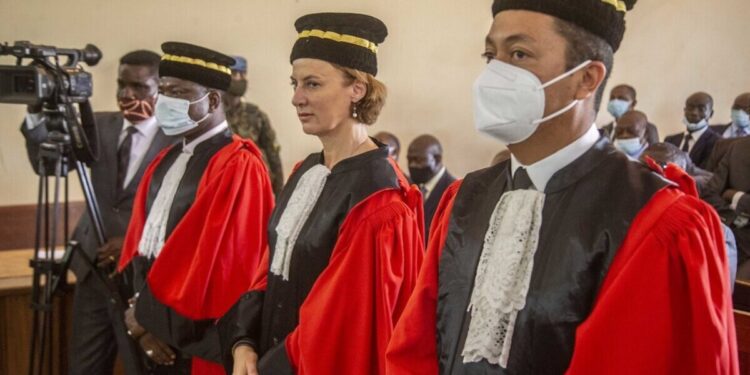The arraignment before the Special Criminal Court of one of the Central African Republic’s most wanted suspects has set the troubled country on a new path to justice.
Captain Eugène Ngaïkosset, also known as the “The Butcher of Paoua”, was on September 4, 2021 reported to have been arrested and was charged with crimes against humanity just days later, on September 10. Although the court stated that Ngaïkosset had his rights and the charges brought against read to him in the presence of his lawyer, it did not specify what he was accused of.
It was not immediately clear when his trial would begin or whether he would remain in custody during the trial period. The court announced that its Investigative Judges would consider the matter of his detention.
Ngaïkosset’s case brings into focus the Special Criminal Court (SCC), a hybrid international tribunal with the mandate to try individuals accused of “serious violations of human rights and international humanitarian law”, including war crimes, crimes against humanity, and genocide in the Central African Republic (CAR) from January 1, 2003.
The SCC is located in the capital Bangui and although it held its inaugural session on October 22, 2018, has yet to hear its first case. It was set up as a response to a vicious conflict that raged from late 2012 to 2014 between the Seleka armed group, the CAR government, and the anti-balaka armed forces. The fighting prompted the United Nations Security Council to establish a peacekeeping force in the country in April 2014.
The SCC resulted from a memorandum of understanding between the United Nations and the then-transitional government of CAR in August 2014. The court’s statute was adopted by transitional President Catherine Samba-Panza in June 2015, and its rules of procedure and evidence adopted in July 2018. On December 4, 2018, the SCC published its investigation and prosecution strategy, after which investigations formally began.
The court is staffed by both international and national judges and prosecutors, and benefits from international assistance.
Ngaïkosset’s case comes at an important point in the court’s history as it prepares to start hearings. The substitute prosecutor, Alain Tolmo, announced on September 8, 2021 that the SCC would begin its first trials before the end of the year. It is not clear what case it will begin with, but the court has said it has multiple matters under investigation. Earlier, sources had indicated that the court had 21 suspects in custody, three of whom were arrested after the massacre of 46 civilians near Paoua, in the north of the country, in May 2019.
The court has a tight schedule as it has limited time to complete its work. The countdown on its five-year mandate started on the date of its inaugural hearing, in October 2018. The mandate may be renewed only once, for a maximum of 10 years.
This is not the first time that Ngaïkosset has been in custody in connection with the abuses he is suspected of. An arrest warrant was issued against him in April 2014 for the crimes and human rights abuses committed during President François Bozizé’s rule. In May 2015 after his arrest, Ngaïkosset was transferred from Congo-Brazzaville to Bangui. He was moved to the research and investigation section of the national gendarmerie, or the SRI, its French acronym. He escaped after five days in unclear circumstances.
He was a fugitive on several wanted lists. In December 2015 he was placed on the UN sanctions list for perpetrating violence aimed at destabilising the transitional government in CAR and “planning, directing, or committing acts that violate international human rights law or international humanitarian law … including acts involving sexual violence, targeting of civilians, ethnic- or religious-based attacks, attacks on schools and hospitals, and abduction and forced displacement”. That same month, the US Department of the Treasury’s Office of Foreign Assets Control also sanctioned Ngaïkosset for “engaging in actions that threaten … peace, security, or stability.”
His arrest comes at another troubled time in his country, after a new rebellion erupted in December 2020, putting at risk a new peace deal between the government and several armed groups signed in February 2019.
Ngaïkosset has a long history in CAR’s wars. In 2005, the then lieutenant led a presidential guard unit based in the town of Bossangoa at the beginning of a period of rebellions against the government of former President Bozizé. His alleged abuses include attacks against civilians suspected of supporting the Popular Army for the Restoration of the Republic and Democracy (Armée Populaire pour la Restauration de la République et la Démocratie, APRD), a rebel movement led by former presidential guards under former President Ange-Félix Patassé in the northwestern provinces, where Patassé was from. Bozizé deposed Patassé in 2003. Ngaïkosset’s unit was one of several presidential squads implicated in violations of international law, including serious human rights violations between 2005 and 2007.
After his escape from custody in 2015, Ngaïkosset continued to be active with anti-balaka militias – a collection of local armed groups that emerged in mid-2013 to fight against the Seleka, a predominantly Muslim rebel group that took power in 2013 and ousted Bozizé.
The humanitarian crisis in CAR continues to worsen, driving further criminality and conflict. More than half of the country’s population of 4.6 million depends on humanitarian assistance, the highest UN per capita case load globally. This number is likely to increase this year as many communities, which depend on farming, have been unable to plant crops due to increasing insecurity and subsequent displacement.







